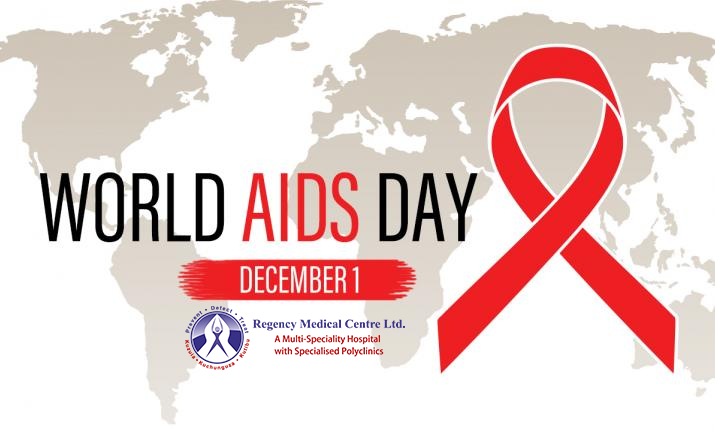WORLD AIDS DAY 2019: FOCUSING ON OFFERING PSYCHOSOCIAL SUPPORT TO PATIENTS OF HIV AND AIDS
495 viewsWORLD AIDS DAY 2019: FOCUSING ON OFFERING PSYCHOSOCIAL SUPPORT TO PATIENTS OF HIV AND AIDS
What is HIV and AIDS?
HIV stands for Human Immunodeficiency Virus (HIV). HIV is a sexually transmissible virus which is acquired through sexual intercourse. The virus can spread from needles, blood transfusion while giving birth and breastfeeding to adults and infants. Once it enters the human body, the HIV virus weakens its victim’s immune system by attacking the T-cells which are responsible for protecting us against infections. In due course of time, if not controlled, HIV progresses to its most severe form which is Acquired Immune Deficiency Syndrome (AIDS).
Once a person is diagnosed with AIDS which happens when the T-cell count decreases to less than 200 cells and they are vulnerable to opportunistic illnesses which include cancers
People diagnosed with AIDS live up to 3 years without treatment. According to the Centers for Disease Control, AIDS has the following common symptoms:
- Chills
- Fever
- Sweats
- Swollen lymph glands
- Weakness
- Weight loss
In its latest findings on HIV AIDS globally, UNAIDS reports that in the year 2018 there were:
- 1.7 MILLION people were newly infected with HIV in 2018
- 37.9 MILLION people were living with HIV
- 770,000 people died of AIDS-related illnesses
Despite these figures, UNAIDS reports that the “pace of progress in reducing new HIV infections, increasing access to treatment and ending AIDS-related deaths is slowing down.”
Why Psychosocial Support is Important for People Living with HIV /AIDS?
HIV and AIDS is a disease for which there is no cure. Although retroviral therapy is successful in controlling HIV from progressing to its most severe form i.e. AIDS (Acquired Immuno Deficiency Virus Syndrome) and helps people live normal lives, the patient cannot become HIV-free. In the case of AIDS, death is the ultimate fate of the patient.
This World AIDS Day, we would like to highlight the need to offer emotional and moral support to HIV and AIDS patients. This is important in order to strengthen them mentally to cope with this life-altering situation.
It is extremely important to ensure the mental health of persons affected with any serious disease and more so HIV and AIDS. It is natural for persons diagnosed with serious to chronic diseases to become anxious, withdrawn and stressed out. After all, our well-being and that of our loved ones largely depend on our good health. When our health is severely compromised, it can have serious life consequences such as high medical costs, loss of employment, a family member may have to give up their job and care for us leading to more stress and difficulties. Consequences of HIV AIDS also extend to the macro social context such as “stigma, discrimination, poverty and marginalization.”
The burden of a life-threatening disease need not be just physical or limited to the person going through it. It extends to the person’s mental and emotional well-being as well as that of their family, near and dear ones. In a difficult time like this, offering support in the capacity of a well-wisher, friend, relative or colleague can go a long way in probably not curing the disease completely but at least reducing the burden of disease on the patient by helping them cope better.
The World Health Organization (WHO) recommends psychosocial support for People Living with HIV AIDS (PLWHA). Psychosocial support is important as it “addresses the ongoing psychological and social problems of HIV infected individuals, their partners, families and caregivers.” (HIV/AIDS, WHO, 2019). Therefore psychosocial support encompasses not only the patient but also those in his or her social network. As a friend or relative of an HIV/AIDS patient you too could be in need of psychosocial support. Therefore it is important to know about certain guidelines for offering and receiving psychosocial support in this challenging situation.
- As friends, caregivers and individuals offering love, respect and support is of prime importance.
- Busting all myths about AIDS and PLWHA and removal of any biases and prejudices
- Recommending counselling for PLWHA and for yourself if you are a close family member/ child/ spouse of the affected.
- Encouraging the patient to be in charge of their own care so that they do not become completely dependent on their caregivers and lose their self-confidence
- Encouraging patients to do household chores, errands, things they like etc. so that feel useful and productive. With the right medication and care, PLWHA can lead healthy and productive lives.
- Support adherence to medication. Ensure the patient is taking his or her medication on time and make them feel hopeful about feeling better soon.
- Listening to them when they feel like talking
- Above all, get help or support yourself if you’re feeling overwhelmed as a caregiver. This could include counselling, therapy, support groups etc. Getting support will only make you a better caregiver and help the patient cope better as well.


